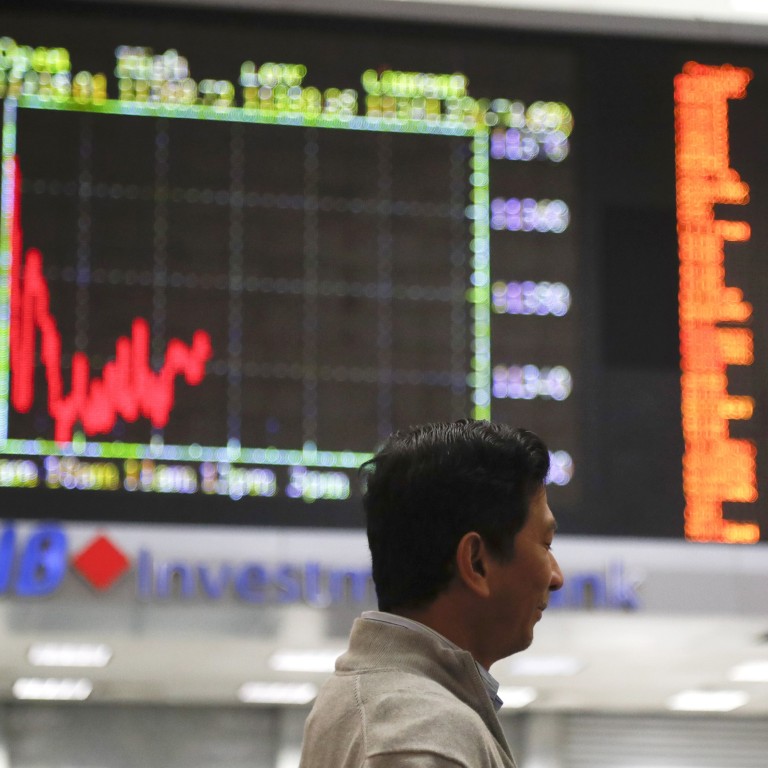
Asia’s equity markets extend global sell-off, taking the cue from US$1 trillion overnight wipeout as trade war escalates
- Global equities had US$1 trillion in market cap wiped off in overnight trading
- Hong Kong closes down 1.5 per cent after returning from a holiday
Asian equity markets extended the global sell-off of stocks, taking cues from the US$1 trillion global wipeout overnight, as investors sought shelter in safe havens from the escalating US-China trade war.
The biggest declines were seen in the stock indexes of markets that are reliant on the Chinese economy, with Hong Kong’s benchmark Hang Seng Index closing down 1.5 per cent after returning from a day’s holiday.
Meanwhile, the S&P/ASX200 index in commodity-dependent Australia fell 0.92 per cent. Markets dropped from Japan to Singapore and Taipei, with South Korea’s Kospi and Kosdaq indexes the only two that managed to eke out advances.
“As there isn’t a clear schedule for meetings between Chinese and US negotiators, markets are likely to be more volatile, especially in the absence of any substantive information not written in a tweet,” said Kerry Craig, a strategist at JPMorgan Asset Management.
“Investors should prepare themselves for more volatile markets, but always have an eye on where value is created when sentiment can cause markets to swing too far in one direction.”
The retaliatory measure followed the move by the White House last week to more than double the tariffs on shipments from China.
“The tariff increase and potential for additional tariffs are significant setbacks in the protracted trade dispute between the world’s two largest economies,” said Moody’s Investors Service’s senior vice-president of Corporate Finance Lina Choi and associate managing director Clement Wong.
Hong Kong’s truckers hit hard by escalation in US-China trade war
“We expect uncertainties around trade will continue before the US and China reach some form of a deal. But the negative effects of the existing and potential tariffs [is likely to] be widespread, given the many companies along supply chains.
“In China, few companies will be immune to the indirect negative impact. Consumption and investment will weaken, which will ultimately hurt economic growth.”
The top three of the 10 biggest categories of Chinese products facing higher US tariffs comprise telecommunications equipment, printed circuit boards and computer processing units, valued at a combined US$37.2 billion, or 65 per cent, of the total US$57.3 billion, according to a Bloomberg analysis.
Monday’s losses on the mainland were clipped, but indexes still closed down. The Shanghai Composite fell 0.62 per cent to 2,883.61, after slight gains in late morning trading, and the CSI 300 of large stocks listed on the Shanghai and Shenzhen markets, ended down 0.64 per cent to 3,645.15.
The Shenzhen Manufacturing Index, which tracks the performance of 1,421 manufacturers and industrial companies in China’s technology hub of Shenzhen, led declines in the benchmark Composite Index.
Over 1,000 stocks on the manufacturing index fell. ZTE, one of the world’s largest producers of telecommunications equipment, earlier fell by as much as 2 per cent, though it trimmed the loss to close down 0.3 per cent.
Foreign investors sold 10.6 billion yuan (US$1.54 billion) of Chinese stocks through exchange links on Tuesday. It was the biggest single-day outflow since at least December 2016, when the stock connect programme between Shenzhen and Hong Kong started.
“China’s stocks had earlier fallen more than US and global stocks, so the reaction is pretty mild today,” said Dai Ming, a fund manager at Hengsheng Asset Management in Shanghai.
“It is also a bit risky to further short Chinese stocks at this moment. The possibility is always there that a trade deal between the two countries will finally be struck. The market is in a state of equilibrium now, unless something unexpected suddenly happens, such as a sharp decline in economic growth.”


